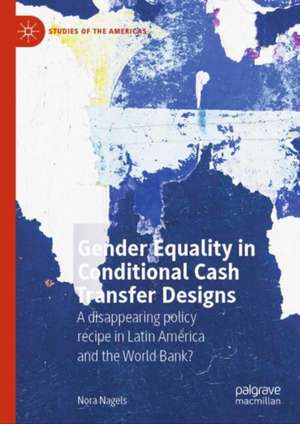Gender Equality in Conditional Cash Transfer Designs: A disappearing policy recipe in Latin America and the World Bank? : Studies of the Americas
Autor Nora Nagelsen Limba Engleză Hardback – 11 sep 2024
Din seria Studies of the Americas
- 20%
 Preț: 566.73 lei
Preț: 566.73 lei -
 Preț: 357.58 lei
Preț: 357.58 lei -
 Preț: 300.85 lei
Preț: 300.85 lei -
 Preț: 303.28 lei
Preț: 303.28 lei -
 Preț: 305.50 lei
Preț: 305.50 lei -
 Preț: 308.36 lei
Preț: 308.36 lei -
 Preț: 312.10 lei
Preț: 312.10 lei -
 Preț: 298.66 lei
Preț: 298.66 lei -
 Preț: 389.70 lei
Preț: 389.70 lei -
 Preț: 394.12 lei
Preț: 394.12 lei -
 Preț: 388.72 lei
Preț: 388.72 lei -
 Preț: 388.72 lei
Preț: 388.72 lei -
 Preț: 388.72 lei
Preț: 388.72 lei -
 Preț: 389.31 lei
Preț: 389.31 lei -
 Preț: 389.70 lei
Preț: 389.70 lei - 15%
 Preț: 697.65 lei
Preț: 697.65 lei -
 Preț: 392.60 lei
Preț: 392.60 lei -
 Preț: 384.31 lei
Preț: 384.31 lei - 18%
 Preț: 736.81 lei
Preț: 736.81 lei -
 Preț: 390.25 lei
Preț: 390.25 lei -
 Preț: 394.51 lei
Preț: 394.51 lei - 18%
 Preț: 782.52 lei
Preț: 782.52 lei -
 Preț: 393.74 lei
Preț: 393.74 lei -
 Preț: 388.72 lei
Preț: 388.72 lei -
 Preț: 391.61 lei
Preț: 391.61 lei -
 Preț: 382.57 lei
Preț: 382.57 lei -
 Preț: 391.40 lei
Preț: 391.40 lei -
 Preț: 390.08 lei
Preț: 390.08 lei -
 Preț: 388.72 lei
Preț: 388.72 lei - 15%
 Preț: 642.36 lei
Preț: 642.36 lei -
 Preț: 392.75 lei
Preț: 392.75 lei - 15%
 Preț: 503.37 lei
Preț: 503.37 lei -
 Preț: 392.37 lei
Preț: 392.37 lei - 15%
 Preț: 638.43 lei
Preț: 638.43 lei -
 Preț: 388.72 lei
Preț: 388.72 lei -
 Preț: 383.71 lei
Preț: 383.71 lei - 15%
 Preț: 635.65 lei
Preț: 635.65 lei -
 Preț: 388.52 lei
Preț: 388.52 lei -
 Preț: 386.81 lei
Preț: 386.81 lei -
 Preț: 387.75 lei
Preț: 387.75 lei -
 Preț: 392.60 lei
Preț: 392.60 lei -
 Preț: 388.72 lei
Preț: 388.72 lei -
 Preț: 388.72 lei
Preț: 388.72 lei
Preț: 708.83 lei
Preț vechi: 833.92 lei
-15% Nou
Puncte Express: 1063
Preț estimativ în valută:
135.68€ • 147.43$ • 114.04£
135.68€ • 147.43$ • 114.04£
Carte disponibilă
Livrare economică 31 martie-14 aprilie
Preluare comenzi: 021 569.72.76
Specificații
ISBN-13: 9783031608704
ISBN-10: 3031608704
Ilustrații: X, 190 p. 10 illus.
Dimensiuni: 148 x 210 mm
Ediția:2024
Editura: Springer International Publishing
Colecția Palgrave Macmillan
Seria Studies of the Americas
Locul publicării:Cham, Switzerland
ISBN-10: 3031608704
Ilustrații: X, 190 p. 10 illus.
Dimensiuni: 148 x 210 mm
Ediția:2024
Editura: Springer International Publishing
Colecția Palgrave Macmillan
Seria Studies of the Americas
Locul publicării:Cham, Switzerland
Cuprins
Chapter One – Introduction.- Chapter Two – Mechanisms and Configuration. Understanding the travels of a policy instrument.- Chapter Three – Cooking from a new recipe: Progresa and Bolsa Família with gender equality goals.- Chapter Four – Standardization of CCTs without gender equality.- Chapter Five – Juntos and the Bonos: translation with innovations rooted in exclusionary institutional legacies.- Chapter Six – Lessons for gender equality and social policies.
Notă biografică
Nora Nagels is an associate professor of political science at the Université de Québec à Montréal (UQAM). She earned her PhD in Development Studies from the Graduate Institute, Geneva in 2013. She pursued postdoctoral training at the Research Chair in Citizenship and Governance in the Political Science department at the Université de Montréal. She co-founded l’Équipe de recherche sur l’inclusion et la gouvernance en Amérique latine (ERIGAL). Her research focuses on gender, the World Bank, citizenship and social policies in Latin America. She has recently published on comparative politics, conditional cash transfers, development, citizenship and gender in leading journals such as the International Feminist Journal of Politics; Social Politics; Social Policy & Administration, Social Policy & Society, Politica and Sociedad and Revue internationale de politique comparée.
Textul de pe ultima copertă
Few aspects of social policy have been more controversial than the effects of Conditional Cash Transfers (CCTs) on gender relations and policy outcomes on gender relations are linked to policy designs. Development and social policy communities have recognized gender equality as a cornerstone of development and social progress. Nonetheless, designing policy to integrate gender equality goals into social policies is rendered that much more complicated as and when these policies travel. In Mexico in 1997, the first CCT, Progresa, looked quite different than CCTs look today. Embedded in the design was Affirmative Action geared toward girls, as was a clearly enunciated concern about the program's effects on female empowerment. For the 2005 Peruvian CCT, Juntos, the story was very different. Its design did not include any gender equality goals and it reproduced long-standing social policy legacies of gendered exclusions. Therefore, this book is about the alteration of Conditional Cash Transfer designs in relation to gender equality goals as they have made their way through Mexico, Brazil, Peru, Bolivia as well as through the World Bank. This book aims to account for “the fading goal of gender equality” (Jenson 2015) across time as part of Latin America trajectory. In short, it tracks the how and the why of this trajectory in relation to gender equality goals.
Nora Nagels is Associate Professor of Political Science at the Université de Québec à Montréal (UQAM).
Nora Nagels is Associate Professor of Political Science at the Université de Québec à Montréal (UQAM).
Caracteristici
Looks at how gender has been integrated into social policy in Latin America Focuses in particular on the gender implications of Conditional Cash Transfers across Latin America Scrutinizes the influence of the World Bank on social policy choices compared to the national political configurations
